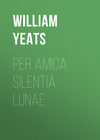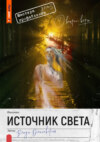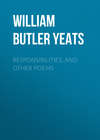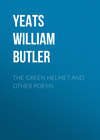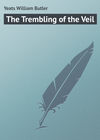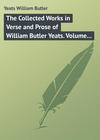Kitobni o'qish: «Per Amica Silentia Lunae»
PROLOGUE
My Dear “Maurice” – You will remember that afternoon in Calvados last summer when your black Persian “Minoulooshe,” who had walked behind us for a good mile, heard a wing flutter in a bramble-bush? For a long time we called her endearing names in vain. She seemed resolute to spend her night among the brambles. She had interrupted a conversation, often interrupted before, upon certain thoughts so long habitual that I may be permitted to call them my convictions. When I came back to London my mind ran again and again to those conversations and I could not rest till I had written out in this little book all that I had said or would have said. Read it some day when “Minoulooshe” is asleep.
W. B. YEATS.
May 11, 1917.
EGO DOMINUS TUUS
Hic
On the grey sand beside the shallow stream,
Under your old wind-beaten tower, where still
A lamp burns on above the open book
That Michael Robartes left, you walk in the moon,
And, though you have passed the best of life, still trace,
Enthralled by the unconquerable delusion,
Magical shapes.
Ille
By the help of an image
I call to my own opposite, summon all
That I have handled least, least looked upon.
Hic
And I would find myself and not an image.
Ille
That is our modern hope, and by its light
We have lit upon the gentle, sensitive mind
And lost the old nonchalance of the hand;
Whether we have chosen chisel, pen, or brush,
We are but critics, or but half create,
Timid, entangled, empty, and abashed,
Lacking the countenance of our friends.
Hic
And yet,
The chief imagination of Christendom,
Dante Alighieri, so utterly found himself,
That he has made that hollow face of his
More plain to the mind’s eye than any face
But that of Christ.
Ille
And did he find himself,
Or was the hunger that had made it hollow
A hunger for the apple on the bough
Most out of reach? And is that spectral image
The man that Lapo and that Guido knew?
I think he fashioned from his opposite
An image that might have been a stony face,
Staring upon a Beduin’s horse-hair roof,
From doored and windowed cliff, or half upturned
Among the coarse grass and the camel dung.
He set his chisel to the hardest stone;
Being mocked by Guido for his lecherous life,
Derided and deriding, driven out
To climb that stair and eat that bitter bread,
He found the unpersuadable justice, he found
The most exalted lady loved by a man.
Hic
Yet surely there are men who have made their art
Out of no tragic war; lovers of life,
Impulsive men, that look for happiness,
And sing when they have found it.
Ille
No, not sing,
For those that love the world serve it in action,
Grow rich, popular, and full of influence;
And should they paint or write still is it action,
The struggle of the fly in marmalade.
The rhetorician would deceive his neighbours,
The sentimentalist himself; while art
Is but a vision of reality.
What portion in the world can the artist have,
Who has awakened from the common dream,
But dissipation and despair?
Hic
And yet,
No one denies to Keats love of the world,
Remember his deliberate happiness.
Ille
His art is happy, but who knows his mind?
I see a schoolboy, when I think of him,
With face and nose pressed to a sweetshop window,
For certainly he sank into his grave,
His senses and his heart unsatisfied;
And made – being poor, ailing and ignorant,
Shut out from all the luxury of the world,
The ill-bred son of a livery stable keeper —
Luxuriant song.
Hic
Why should you leave the lamp
Burning alone beside an open book,
And trace these characters upon the sand?
A style is found by sedentary toil,
And by the imitation of great masters.
Ille
Because I seek an image, not a book;
Those men that in their writings are most wise
Own nothing but their blind, stupefied hearts.
I call to the mysterious one who yet
Shall walk the wet sand by the water’s edge,
And look most like me, being indeed my double,
And prove of all imaginable things
The most unlike, being my anti-self,
And, standing by these characters, disclose
All that I seek; and whisper it as though
He were afraid the birds, who cry aloud
Their momentary cries before it is dawn,
Would carry it away to blasphemous men.
December 1915.
ANIMA HOMINIS
I
When I come home after meeting men who are strange to me, and sometimes even after talking to women, I go over all I have said in gloom and disappointment. Perhaps I have overstated everything from a desire to vex or startle, from hostility that is but fear; or all my natural thoughts have been drowned by an undisciplined sympathy. My fellow-diners have hardly seemed of mixed humanity, and how should I keep my head among images of good and evil, crude allegories.
But when I shut my door and light the candle, I invite a Marmorean Muse, an art, where no thought or emotion has come to mind because another man has thought or felt something different, for now there must be no reaction, action only, and the world must move my heart but to the heart’s discovery of itself, and I begin to dream of eyelids that do not quiver before the bayonet: all my thoughts have ease and joy, I am all virtue and confidence. When I come to put in rhyme what I have found it will be a hard toil, but for a moment I believe I have found myself and not my anti-self. It is only the shrinking from toil perhaps that convinces me that I have been no more myself than is the cat the medicinal grass it is eating in the garden.
How could I have mistaken for myself an heroic condition that from early boyhood has made me superstitious? That which comes as complete, as minutely organised, as are those elaborate, brightly lighted buildings and sceneries appearing in a moment, as I lie between sleeping and waking, must come from above me and beyond me. At times I remember that place in Dante where he sees in his chamber the “Lord of Terrible Aspect,” and how, seeming “to rejoice inwardly that it was a marvel to see, speaking, he said, many things among the which I could understand but few, and of these this: ego dominus tuus”; or should the conditions come, not as it were in a gesture – as the image of a man – but in some fine landscape, it is of Boehme, maybe, that I think, and of that country where we “eternally solace ourselves in the excellent beautiful flourishing of all manner of flowers and forms, both trees and plants, and all kinds of fruit.”
II
When I consider the minds of my friends, among artists and emotional writers, I discover a like contrast. I have sometimes told one close friend that her only fault is a habit of harsh judgment with those who have not her sympathy, and she has written comedies where the wickedest people seem but bold children. She does not know why she has created that world where no one is ever judged, a high celebration of indulgence, but to me it seems that her ideal of beauty is the compensating dream of a nature wearied out by over-much judgment. I know a famous actress who in private life is like the captain of some buccaneer ship holding his crew to good behaviour at the mouth of a blunderbuss, and upon the stage she excels in the representation of women who stir to pity and to desire because they need our protection, and is most adorable as one of those young queens imagined by Maeterlinck who have so little will, so little self, that they are like shadows sighing at the edge of the world. When I last saw her in her own house she lived in a torrent of words and movements, she could not listen, and all about her upon the walls were women drawn by Burne-Jones in his latest period. She had invited me in the hope that I would defend those women, who were always listening, and are as necessary to her as a contemplative Buddha to a Japanese Samurai, against a French critic who would persuade her to take into her heart in their stead a Post-Impressionist picture of a fat, ruddy, nude woman lying upon a Turkey carpet.
There are indeed certain men whose art is less an opposing virtue than a compensation for some accident of health or circumstance. During the riots over the first production of the Playboy of the Western World Synge was confused, without clear thought, and was soon ill – indeed the strain of that week may perhaps have hastened his death – and he was, as is usual with gentle and silent men, scrupulously accurate in all his statements. In his art he made, to delight his ear and his mind’s eye, voluble daredevils who “go romancing through a romping lifetime … to the dawning of the Judgment Day.” At other moments this man, condemned to the life of a monk by bad health, takes an amused pleasure in “great queens … making themselves matches from the start to the end.” Indeed, in all his imagination he delights in fine physical life, in life where the moon pulls up the tide. The last act of Deirdre of the Sorrows, where his art is at its noblest, was written upon his death-bed. He was not sure of any world to come, he was leaving his betrothed and his unwritten play – “Oh, what a waste of time,” he said to me; he hated to die, and in the last speeches of Deirdre and in the middle act he accepted death and dismissed life with a gracious gesture. He gave to Deirdre the emotion that seemed to him most desirable, most difficult, most fitting, and maybe saw in those delighted seven years, now dwindling from her, the fulfilment of his own life.
III
When I think of any great poetical writer of the past (a realist is an historian and obscures the cleavage by the record of his eyes) I comprehend, if I know the lineaments of his life, that the work is the man’s flight from his entire horoscope, his blind struggle in the network of the stars. William Morris, a happy, busy, most irascible man, described dim colour and pensive emotion, following, beyond any man of his time, an indolent muse; while Savage Landor topped us all in calm nobility when the pen was in his hand, as in the daily violence of his passion when he had laid it down. He had in his Imaginary Conversations reminded us, as it were, that the Venus de Milo is a stone, and yet he wrote when the copies did not come from the printer as soon as he expected: “I have … had the resolution to tear in pieces all my sketches and projects and to forswear all future undertakings. I have tried to sleep away my time and pass two-thirds of the twenty-four hours in bed. I may speak of myself as a dead man.” I imagine Keats to have been born with that thirst for luxury common to many at the outsetting of the Romantic Movement, and not able, like wealthy Beckford, to slake it with beautiful and strange objects. It drove him to imaginary delights; ignorant, poor, and in poor health, and not perfectly well-bred, he knew himself driven from tangible luxury; meeting Shelley, he was resentful and suspicious because he, as Leigh Hunt recalls, “being a little too sensitive on the score of his origin, felt inclined to see in every man of birth his natural enemy.”
IV
Some thirty years ago I read a prose allegory by Simeon Solomon, long out of print and unprocurable, and remember or seem to remember a sentence, “a hollow image of fulfilled desire.” All happy art seems to me that hollow image, but when its lineaments express also the poverty or the exasperation that set its maker to the work, we call it tragic art. Keats but gave us his dream of luxury; but while reading Dante we never long escape the conflict, partly because the verses are at moments a mirror of his history, and yet more because that history is so clear and simple that it has the quality of art. I am no Dante scholar, and I but read him in Shadwell or in Dante Rossetti, but I am always persuaded that he celebrated the most pure lady poet ever sung and the Divine Justice, not merely because death took that lady and Florence banished her singer, but because he had to struggle in his own heart with his unjust anger and his lust; while unlike those of the great poets, who are at peace with the world and at war with themselves, he fought a double war. “Always,” says Boccaccio, “both in youth and maturity he found room among his virtues for lechery”; or as Matthew Arnold preferred to change the phrase, “his conduct was exceeding irregular.” Guido Cavalcanti, as Rossetti translates him, finds “too much baseness” in his friend:
“And still thy speech of me, heartfelt and kind,
Hath made me treasure up thy poetry;
But now I dare not, for thy abject life,
Make manifest that I approve thy rhymes.”
